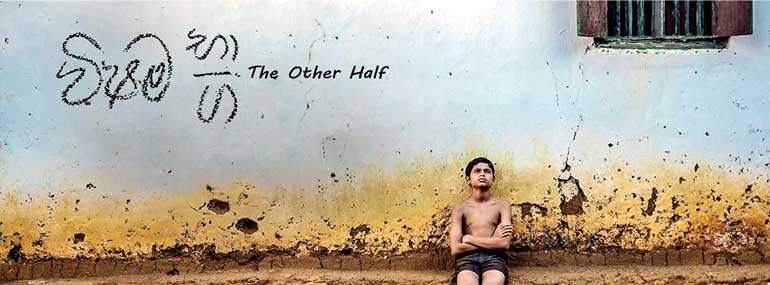Thursday Feb 26, 2026
Thursday Feb 26, 2026
Monday, 27 January 2020 00:00 - - {{hitsCtrl.values.hits}}

I was surprised to hear that the first time in Sri Lankan cinema, a movie had won 50 awards and yet has not received the needed recognition from us. It is the first Sinhala film produced by a Buddihst monk with the noble aim of donating the entire proceedings to the Cronic Kidney Decease (CKD) related work, making it the first ‘charity movie’ in Sri Lanka. Leaving all those facts aside, I expereinced a rare cinematic depiction of the bitter realities of a battered community often neglected by us.
Overview
The movie ‘Vishama Bhaga’ produced by Ven. Aludeniye Subodhi Thero for Shraddha Film Productions was the debut direction of promising Lalith Rathnayake. Twin brothers in real life, Pankaja Wickramarathna and Pansilu Wickramarathna play the lead child roles in it showing potential brilliance. 
Other veterans such as Jackson Anthony (tough mathematics teacher), Kaushalya Fernando (widow with twin boys who lost her husband who died of CKD) and Hemasiri Liyanage (grandfather of the twins who is in the verge of dying) do justice to their due roles. The music composed by Chamara Ruwanthilake has given an overall serene and sorrowful theme showcasing the bitter truth. The award-winning cinematography by Palitha Perera has added much value to the vibrant theme.
It is neither a children’s movie showcasing the studying struggle of twins nor an adult movie highlighting complex relationships of a poverty-stricken handfuls. For me, it is more of a depiction of the impermanence of life, which goes well with eastern religious precepts, and its implications in multiple fronts with an eye-opening invitation.
The story in a nutshell
‘Vishama Bhaga’ depicts a story of twin brothers, who though look almost alike, are different in many ways. Ruwansiri (played by Pansilu) struggles to cope up with schooling challenges. He is the one who takes a big plastic can to fetch better quality water from a faraway water source. The water in the living vicinity is not good for consumption as it had created so many deaths due to CKD. He stops several times, keeps on panting as the bully is too heavy for his tiny hands. One day he gets unusually late and his mother goes in search of him with other villagers and found him sitting half way through with fatigue. She says, “We would rather drink polluted water and die rather than getting attacked by a wild elephant and die.”
Ruwansiri is much interested in music and he prepares for a song competition with his music teacher. The song depicts the eternal yearning for water, ‘Vahinna Wessak Vahinna’ (Let it rain and rain). He is struggling with his mathematics and often gets scolded by his mathematics teacher. He seeks support from his twin brother Kamalsiri (played by Pankaja), who finds it difficult to inculcate the fundamentals and gives up many a time with a sarcastic comment.
This story unfolds in the backdrop of Ruwansiri’s ailing grandfather (Hemasiri Liyanage) telling him various stories of how the rural farming without harmful fertilisers was done in protecting the flora and fauna. He recites and entices Ruwansiri also to do so, with some sorrowful poems about birds seeking water in a prolonged drought. He attempts to help Ruwansiri to learn ‘fractions’ using his ‘Puwak’ (Areca nut) and ‘Giraya’ (special knife).
Whilst Kamalsiri is portrayed as the better learner in mathematics with his studious nature, his self-centeredness in neglecting the grandfather and not helping the mother in fetching water also is shown. The contrasting characters with diverse personalities of the twin brothers are vividly depicted with ironically the same deceiving appearance. Their mother (Kaushlya Fernando) is in the midst of making the ends meet and does the cattle farming and cultivation all by her hard effort. Losing her husband rather early and having the challenge to look after the sick father-in-law makes it even more challenging. The role of a suffering woman who has to feed three is shown with much impact.
Triple aspects of the bitter reality
The film impactfully invites us to reflect on what I would call the triple aspects of the bitter reality of a battered community. It portrays the gravity of the gruesome issues faced by people in economic, educational and existence fronts. It is interesting to dig deeper into these triple aspects, namely, ‘economy’, ‘education’ and ‘existence’.
Economic reality:
According to many sources, the number of deaths caused by the CKD is over 50,000. The common cause attributed to the high prevalence of CKD is the indiscriminate use of substandard agrochemicals, including fertilisers and pesticides. As scientists explain, pesticide residues and the heavy metals, which are mixed with substandard agrochemicals can contaminate soil and groundwater. The need for pure water is the key economic reality for the deserving community in peril.
The film Vishama Bhaga (The Other Half) invites all Sri Lankans to pay attention to the ‘other half’ of our society who is poverty stricken, kidney disease affected, insecure with elephant attacks and deprived of quality education. When one half of the population is engrossed in social media, tasting the ‘R-leaks’ (our version of the Wikileaks), the other half is battered with the bitter reality. It is a clarion call for the authorities to have a balanced and inclusive development with the focus on economic growth and social wellbeing at all levels
Despite the fact that the North Central Province is vital in the production of rice in the country, the innocent farming community there is much exposed to the ill-effects of the excessive use of fertilisers. As reports stated, toxins such as Arsenic, Cadmium and Mercury can be mixed with drinking water creating much harm. Those who are between 40 and 60 are most susceptible, and it was the sad case of the father of the twins in our story. The meagre income generated by the cattle and farming is barely adequate to make ends meet for a widow with two growing children and the sick father-in-law. There were subtle indications that the ‘friendly neighbour’ who helps her for the work in the paddy fields was getting the compensation ‘not in cash but in kind’, exposing the vulnerability of a young widow. The poverty-stricken family struggling to survive can be the story of many such Sri Lankans who need a systemic support for their sustenance.
Education reality
Education typically refers to development of knowledge, values and understanding required in all aspects of life rather than the knowledge and skills relating to particular areas of activity. The whole idea of education is to bring out what is within an individual, in a true sense of unleashing his/her potential. The ill-effects of a teacher centric education where the teacher becomes a Hitler in forcefully pressurising students to gulp all what is being given is vividly portrayed in the movie.
The mathematics teacher (Jackson Anthony) who ‘cannot be controlled even by the Principal of the School’ is a real terror to the kids. This opens up the perennial challenge of teaching mathematics to children in a fun way. I recall writing a previous column on another movie ‘Thala’ where the teacher there was a completely different character who unleashed the potential of the children in a learner-centric manner.
Asela, the young teacher guides the children to believe in themselves in dreaming big and achieving big. What is required is, as what he did, stimulation of the use of multiple intelligences in myriad ways. Also, it effectively narrates how the systemic barriers can be tactfully overcome in experimenting towards progress. It reminds me of what Robert Frost said, “I am not a teacher, but an awakener.”
Such an awakening approach is acutely needed by the present education system in Sri Lanka. Whilst international examinations such as London Advance Level are increasingly becoming student-friendly with standards remained, we still continue to assess what students do not know. Utilising the available resources in the vicinity in a creative manner with student engagement should be the way to create an enjoyable way to study. A swift shift from exam-orientation to excellence-orientation in the broad sense is the dire need.
Existence reality
For me this was the most poignant reality that points us to ponder. In the midst of depicting the harshness, poverty and drought, a scene of a Buddhist monk slowly engaging in the ‘Pindapatha’ walk with a bowl in hand. Ruwansiri respectfully give way to the monk, in the narrow road across the paddy fields destroyed during the night by wild elephants. The overarching theme of impermanence of life is reminded at different intervals with the repeating sight of the Buddhist monk.
It reminds me of what the Bagawath Githa mentioned as Nishkam Karma, which can be described as ‘detached involvement’. “Thou hast a right to action, but only to action, never to its fruits; let not the fruits of thy works be thy motive, neither let there be in thee any attachment in inactivity.” The challenge to survive in the midst of acute uncertainties need a clear understanding of impermanence.
The dire need for pure water rattles their lives on one side. The equally dire need for survival amidst the threat of wild elephants is there on the other side. Continuing to have a contended life at least one day at a time, shown by the sick elderly man, the grandfather of Ruwansiri is the positive sign of grappling with the existence reality.
Way forward
The film Vishama Bhaga (The Other Half) invites all Sri Lankans to pay attention to the ‘other half’ of our society who is poverty stricken, kidney disease affected, insecure with elephant attacks and deprived of quality education. When one half of the population is engrossed in social media, tasting the ‘R-leaks’ (our version of the Wikileaks), the other half is battered with the bitter reality. It is a clarion call for the authorities to have a balanced and inclusive development with the focus on economic growth and social wellbeing at all levels.
“The world is moved along, not only by the mighty shoves of its heroes, but also by the aggregate of tiny pushes of each honest worker”, so said Helen Keller. The little actions with a good heart will go a long way in uplifting the society in helping the ‘other half’.
(The writer can be reached through [email protected], [email protected] or www.ajanthadharmasiri.info.)